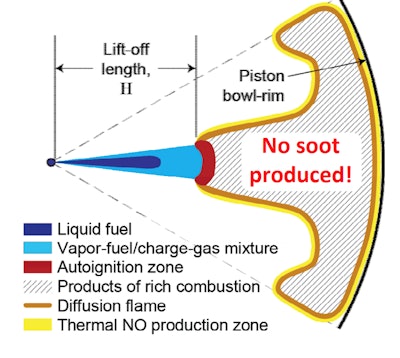
When I started writing at Hard Working Trucks four years ago, diesel was under heavy attack in the mainstream news brought on largely by Volkswagen’s Dieselgate scandal.
Even today, while searching the word ‘diesel’ on Google, nine of the top 10 news stories were negative with some headlines condemning the fuel as dirty and destined for the sidelines.
Thankfully, that one story out of ten takes a more reasoned approach though the headline leans towards an all too familiar bias and signals a disappointing lack of understanding.
Scientific American’s recent story, “Can Diesel Finally Come Clean?” points to an invention that uses ducted fuel injection (DFI) with “Bunsen burner-inspired tubes” to provide cleaner combustion that may nix the need for heavy and costly after-treatment systems. Ford and Caterpillar are supporting R&D for Charles Mueller’s patented DFI system. Combustion experts at Toyota, Georgia Tech and Sandia National Laboratories have already reported promising results. (Photo above is from Sandia’s report.)
All this to say that diesel technology has made huge strides that are often underreported or, worse yet, not reported at all.
In looking back at 2019, we’ve seen the renewable diesel market grow with big players like Shell and 76 getting into the mix. The drop-in fuel, which can be made from plant and/or animal sources, reduces emissions while offering a higher cetane level. Ruan Transportation joined a growing list of fleets using renewable diesel. They’ve been blending the fuel in an 80/20 mix with biodiesel (80 percent renewable diesel; 20 percent bio) in their Central Valley fleet in California.
In November, we ran a story on Charlotte Water in North Carolina which has been busy trying various alternative fuels including most recently renewable diesel. Fuel supplied by Iowa-based Renewable Energy Group reduced greenhouse gas emissions by approximately 75 tons in the first three months of the pilot.
Achates turned plenty of heads in March when it announced that its two-stroke, opposed-piston diesel engine with near-zero emissions would be tested in a Peterbilt 579 in California. With its 2020 Silverado 1500, Chevy joined Ford and Ram in offering a half-ton truck with a diesel powerplant. This is the first diesel offered in Chevy’s light-duty trucks since 1997, and the brand’s first-ever inline-six for a full-size, light duty truck.
This past summer, Ram let reporters put their latest 3rd generation EcoDiesel to work in Minnesota. While there Ram announced that all of its 2020 half-ton pickups would be available with an oil burner. Jeep Gladiator will also have that option for the 2021 model year.
And Motor Trend’s 2020 Truck of the Year? Ram Heavy Duty. The 2019 Ram 3500 equipped with a 6.7-liter Cummins diesel was the first pickup to break the triple-digit torque barrier with its 1,000 lb.-ft. rating.
While electric trucks generated plenty of buzz in 2019, their level of development over the past 100 years relative to diesel technology is not that impressive. In other words, range—just as the United States Post Office pointed out during trials in the late 1800s—is still an issue. Battery flammability, as also reported years ago by the USPS, remains a concern. Progress is being made albeit slowly. Success still resides with battery chemistry. Tesla’s new Cybertruck will be using its latest battery technology which the company says will deliver up to 500 miles of range. But is that on a flat plane in a vacuum? Off-road? Towing? Hauling? Who knows.
In the interim, there’s dependable diesel which continues to make advancements in fuel efficiency while at the same time lowering emissions. That point was made clear to me in the spring when a Florida Highway Patrol truck inspector stopped to show me how impressed he was with a clean exhaust pipe on a long-haul truck. Though obvious the truck had been at work for a while, the pipe was devoid of any black soot. I was so impressed that I took a picture (shown below).
And I’m far from being the only one impressed with diesel developments in 2019. As Scientific American makes clear, diesel is not going away anytime soon.
“Green replacements, based on electrochemical batteries and hydrogen fuel cells, for example, do not yet have the juice to replace diesel as a critical power source in the global economy,” Steven Ashley writes. “Diesel engines are robust, durable, fuel-efficient and, crucially, can provide the big torque needed to move big things. Most of the hundreds of millions of medium and large long-haul trucks on highways today run on diesel—as do majorities of the world’s trains, ships, off-road vehicles and heavy machinery, not to mention many electricity generators, domestic pickup trucks and European passenger cars.”
 Diesel has been ‘coming clean’ for years. An FHP truck inspector showed me this pipe during a pit inspection earlier this year. His point? How clean diesel emissions had become.
Diesel has been ‘coming clean’ for years. An FHP truck inspector showed me this pipe during a pit inspection earlier this year. His point? How clean diesel emissions had become.









